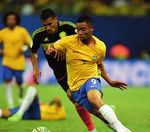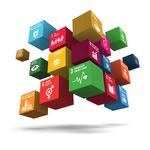DEVELOPMENT OF THE SUSTAINABILITY STRATEGY FOR THE 2018 FIFA WORLD CUP - IF Sustainability Project
←
→
Page content transcription
If your browser does not render page correctly, please read the page content below
IF SUSTAINABILITY PROJECT
The world faces important challenges sourcing & resource management; mobility;
across a wide spectrum of economic, workforce; and climate. These focus
social and environmental issues, and the areas were selected through an extensive
sport community is not immune from their stakeholder engagement process, taking
impacts. The Olympic Movement has into consideration today’s key sustainability
both an opportunity and a duty to actively challenges and the manner in which the
contribute to the global sustainability IOC believes the Olympic Movement
debate in line with its vision of “Building can most significantly contribute to
a better world through sport”. addressing them.
With this in mind, and in response to The case studies are also aligned with
recommendation 5 of Olympic Agenda the United Nations’ (UN) framework of 17
2020 (“Include sustainability within Sustainable Development Goals
the Olympic Movement’s (SDGs). This framework is pivotal
daily operations”), the for the Olympic Movement:
IOC conducted the in September 2015, the UN
International Federation General Assembly confirmed
(IF) Sustainability Project the important role that
throughout 2016. The sport can play in supporting
IOC carried out the project the UN’s 2030 Agenda for
with three objectives: Sustainable Development
obtaining an overview of and its SDGs.
IFs’ sustainability initiatives;
identifying common topics, “Sport is also an important enabler
good practices and shared challenges; of sustainable development. We recognise
and sharing information among the IFs. the growing contribution of sport to the
As part of this project, the IOC realisation of development and peace in its
collaborated with the IFs to compile promotion of tolerance and respect and the
a series of case studies reflecting how contributions it makes to the empowerment
IFs are contributing towards a more of women and of young people, individuals
sustainable world. and communities as well as to health,
Each case study is aligned with one education and social inclusion objectives.”
or more of the IOC’s five sustainability Paragraph 37, UN 2030 Agenda
focus areas: infrastructure & natural sites; for Sustainable DevelopmentFIFA HAS DEVISED A
SUSTAINABILITY PROGRAMME
FOR THE 2018 FIFA WORLD CUP.
H
ighlighting its commitment to the analysis of FWC requirements, bid
sustainability, FIFA made the commitments and regulatory documents; OBJECTIVES
decision in 2009 to include it in the analysis of the 2018 FWC sustainability
its future bidding agreements, starting context; materiality and level-of-influence In order to identify material
with the 2018 FWC bidding process. This analysis; and the validation of strategy issues and develop
required each bidding country to provide through stakeholder consultations. effective measures to
comprehensive information on activities Through this process, nine key issues organise and stage a
aimed at social development, economic and 25 objectives were defined for the more sustainable event in
sustainability and environmental protection Sustainability Strategy in three categories: Russia, FIFA and the 2018
as part of the staging of the FWC. FIFA World Cup Local
In December 2010, the Russian •S
ocial – Contributing to human Organising Committee
Federation was selected to host the and social development: Health & (LOC) have developed
2018 FWC. Then, in late 2013, FIFA safety; Decent work & capacity building; a sustainability strategy
began working with the LOC to create Inclusivity & equality; Social development, for the 2018 FIFA World
a sustainability strategy for the event. healthy living & sport legacy Cup (FWC).
The 2018 FWC in Russia was planned in
close connection with long-term national •E
nvironmental – Protecting the
development strategies and programmes, environment: Green-building standards
with the ultimate goals of creating social, for stadiums; Transport, carbon, energy
environmental and economic benefits & waste management; Risk mitigation
for host cities and regions and creating & biodiversity
a new standard for large events within
the country. •E
conomic – Enhancing local
Between October 2013 and April 2015, economic development: Ethical
FIFA and the LOC completed a four- business practices; Local economic
stage process to develop the strategy: developmentEach project IOC FOCUS AREAS
contributes to
one or more of the
IOC’s sustainability
focus areas and
all 17 of the UN’s INFRASTRUCTURE SOURCING MOBILITY WORKFORCE CLIMATE
& NATURAL SITES & RESOURCE
SDGs: MANAGEMENT
FIFA and the LOC have implemented it accessible to a wide range of more challenging but can have a major process with both desk research and
a Sustainability Management System stakeholders. impact; for example, counteracting the moderation of some training and
(SMS) in accordance with the ISO ticket-holders’ carbon emissions or educational workshops. These external
20121:2012 standard on event COMMUNICATION ensuring stadium accessibility. This providers offer additional resources to
sustainability management. Compliance The final report will be sent to FIFA change has made FIFA’s approach do time-consuming research; provide
requires formal processes to ensure media contacts using various channels. much more grounded, and much more expertise that is not available within the
senior management’s commitment to Copies will also be sent to stakeholders effective at focusing resources where LOC or FIFA; and offer stakeholders a
developing objectives and action plans within the sustainability field. FIFA and the LOC can have the largest comfortable environment in which to
that address key sustainability issues; impact. speak.
providing adequate implementation EVALUATION FIFA has consistently used external As of late 2016, FIFA was on track to
resources; embedding sustainability A similar approach had previously service providers to support the deliver its objectives for the 2018 FWC.
in daily activities; communicating in taken for FIFA’s sustainability strategy
a transparent manner; monitoring at the 2014 FWC, predominantly based
progress; and addressing possible on best practice and international
failures in a proactive manner with a standards such as the ISO 26000 and
perspective of continual improvement. ISO 20121.
Monitoring and reporting on the Perhaps the biggest improvement
implementation of the sustainability since the 2010 FWC is the fact
strategy are requirements of both that FIFA now takes a coordinated
ISO 20121:2012 and the AA1000 and comprehensive approach to
Stakeholder Engagement Standard. sustainability, looking at all possible
Updates will be available in early issues and selecting those most
2017. The final 2018 FWC sustainability relevant both for the organisation and,
report will be published at the end more importantly, for the stakeholders.
of 2018 in English, French, German, Some solutions are easier to organise
Spanish and Russian, thus making and implement than others, which are
FIFA CONTACT: FIFA Sustainability & Diversity Department (sustainability@fifa.org)You can also read
























































